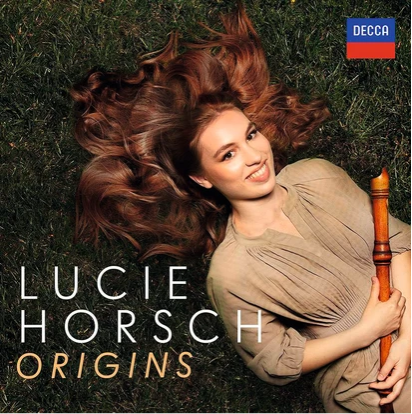ORIGINS – LUCIE HORSCH
Origins – A Remarkable Exploration of Musical Diversity
Sarah Dunlop, October 2022
Lucie Horsch’s latest offering, “Origins,” is an exceptional demonstration of the recorder’s adaptability, showcasing the instrument’s range and versatility across an array of musical styles. This third release under the Decca label adds to Horsch’s reputation as a boundary-pushing musician, recalling the innovative approach of Michala Petri during her years with Philips.
Recorded in the renowned studios of Hilversum’s Muziekcentrum, the album takes listeners on a captivating sonic expedition, delving into the transformations and reinterpretations of musical compositions across time. Horsch’s skillful artistry and technical finesse elevate these transcriptions beyond mere adaptations, urging us to reconsider familiar pieces through a fresh lens.
Throughout “Origins,” Horsch masterfully maneuvers through a rich tapestry of musical expressions. From Bartók’s “Romanian Folk Dances” to the resonant tones of “Hungarian Folksongs from Csik,” her collaboration with the cimbalom evokes an authentic ambiance that transcends eras. The Senegalese hues brought by kora-player Bao Sissoko add a distinctive global dimension, reflecting Horsch’s broad artistic vision and her willingness to explore diverse cultural influences.
Horsch’s nuanced interpretations come to the forefront in Debussy’s “Syrinx,” where her voiceflute playing invokes a haunting atmosphere, capturing the enigmatic essence of the piece. In “She moved through the fair,” the Renaissance tenor recorder resonates with emotional depth, infusing the track with historical significance and a sense of introspection.
The album’s highlights extend beyond the recorder’s traditional realm. Horsch’s renditions of Parker’s “Ornithology” and Piazzolla’s “Histoire du Tango – Café 1930” exhibit her remarkable adaptability, effortlessly navigating intricate ornaments and sultry rhythms. Collaborations with instruments like the bandoneón, guitar, and cimbalom further broaden the sonic palette, creating intricate interplays that showcase the recorder’s potential in unconventional contexts.
Horsch’s skill shines in her transcriptions, where she breathes new life into familiar melodies. Her take on Stravinsky’s “Three Pieces for Solo Clarinet” demonstrates the recorder’s transformative capacity, reimagining the composition with finesse and ingenuity.
“Origins” is not merely a presentation of transcriptions; it is a celebration of the recorder’s evolving role in music. Horsch’s dedication to pushing boundaries and her unique interpretations invite listeners to explore the essence of musical works in fresh and unexpected ways.
In a world of evolving musical landscapes, Lucie Horsch’s “Origins” stands as a testament to the recorder’s timeless allure and its potential for continuous reinvention. With a diverse array of instruments at her disposal and an expansive artistic vision, Horsch’s album serves as an illuminating exploration of music’s past, present, and limitless future.

